- Home
- J. Robert Kennedy
Pompeii's Ghosts (A James Acton Thriller, #9) Page 18
Pompeii's Ghosts (A James Acton Thriller, #9) Read online
Page 18
She had changed the channel and never gone back.
I hope the BBC never gets that ridiculous.
She had no idea what was going on now, and she just pushed her way through the throng and into her waiting limo, several others from the flight joining her.
“What the hell are they talking about?” she asked, looking at the IMF’s Reginald Wangari.
He shook his head. “I have no idea, give me a minute.” He pulled his cellphone out as the car pulled away, the noise of the reporters fading. Laura pulled her own from her purse and turned it on. As it connected to the network her phone vibrated indicating a message. She quickly hit the button to listen, entering her code then pressing 1.
She immediately recognized James’ voice, and knew right away he was in trouble.
“Hi babe, it’s me! I don’t have much time. There’s been some sort of hijacking attempt on the plane and we’re going down.” Her heart slammed against her chest as she pressed the phone against her ear, holding up a finger for everyone else to be quiet. “Dawson was killed by the private security”—she gasped, her stomach tightening—“and a stray bullet caused us to depressurize. We’re in a steep dive, so hopefully we’ll be okay.”
Tears rolled down her cheeks as she realized that if what the reporters had said, this would be the last words she would ever hear him say. A cry erupted from her as she pictured him in his final moments, his words breaking her heart. “But if we don’t make it, know that I love you, and that I treasured every moment we’ve spent together. These last few years have been the greatest of my life, and if I die today, you’ve made my life worth living. Give my love to Mom and Dad, and to Greg and his family. I love you, hon, and I’m sorry I—”
There were several bangs and screams then the message ended.
And she knew the only man she had ever truly loved was dead.
“What is it?” asked Wangari, his voice gentle as he leaned forward and touched her knee.
“A message from James,” she whispered, her voice cracking. She replayed it, putting it on speaker, everyone listening in silence. When it was done, she hung up and curled into the corner of the seat, her eyes watching the streets pass by blindly as she sobbed gently to herself. Wangari was on his phone, and after a few minutes of getting connected to the right person, put it on speaker.
“Go ahead, Adam, you’re on speaker. Tell us what you know.”
“Hello everyone, Adam Lee here, UN. All we know is this. The plane went into a slow descent near the Eritrean-Sudanese border and ignored all hails from Air Traffic Control. At about twenty thousand feet, it went into a steep dive and disappeared from radar. We received no SOS, however the transponders were still sending telemetry indicating the plane was leveling off, then we lost all contact, including transponders.”
“What does that mean? They crashed?” asked someone, Laura still not focusing.
“We believe they had some sort of malfunction, then either a depressurization that required an emergency dive, or an engine failure resulting in the same. Then once they regained control, the plane either exploded or broke apart.”
“Can you be sure of that?” asked Laura, turning toward the phone, her mind still a haze of grief and confusion.
“Not yet,” replied Lee. “We’re trying to get search crews in there now, but the Sudanese aren’t cooperating. We think they’re going to make an attempt at the gold.”
“How did the word get out?” asked Wangari.
“The Eritrean president made an announcement in front of the press about it as soon as the plane left their airspace, which technically meant they had fulfilled their part of the bargain.”
“So everybody in the world knows there’s a billion dollars of gold possibly scattered across the desert of Sudan,” muttered Wangari.
Laura winced, then replayed the voice message, searching for some comfort, some hope, in James’ last words. We’re in a steep dive, so hopefully we’ll be okay. That meant the depressurization was about to be dealt with. There was no way there was a bomb on board—why blow up the gold? Hijack the plane absolutely, but don’t blow it up—the retrieval effort would be insane.
And wasn’t this some huge military transport? How could a military plane be taken out by a single gunshot? It didn’t make sense. She put the phone back in her purse, returning to the conversation.
“I don’t think they crashed,” she said, interrupting whatever was being said.
Nobody spoke for a moment, then Wangari smiled sympathetically. “We all hope that, but the evidence—”
“Tells us that they were slowly descending, that there was a gunshot, they depressurized, there was an emergency dive to deal with that, and then all communication was lost.”
“What gunshot?” asked Lee over Wangari’s phone still on speaker.
“I have a voicemail from my fiancée, Professor James Acton. He said there was an attempted hijacking, some shooting that caused the plane to depressurize and then they went into a dive. This plane was hijacked. They were obviously descending to land somewhere they weren’t supposed to when they were discovered. A gunfight ensued, they depressurized, the pilot took action, then they shut off all communications.”
“That’s quite the assumption,” said Lee.
“Only the last part, and frankly, no more so than your assumption they broke apart in the air. Isn’t this a military transport? Are you telling me a single bullet can break it apart?”
There was silence on the other end of the line, everyone in the back of the limo staring at the tiny Blackberry held in the palm of Wangari’s hand.
Lee finally spoke. “Even if we assume they landed, there’s not much we can do. The Sudanese aren’t cooperating, and we have no idea where the plane is to even start looking.”
“Wouldn’t they land somewhere along their flight path?” asked Wangari.
“If we assume a hijacking, highly unlikely. My guess is they were going to descend smoothly until they were below radar, cut communications, then change course. They could fly for hours in any direction, which I’m certain is what they did if they didn’t crash.”
Laura clenched her fists in frustration. “But where can they land a plane that big without anyone noticing?”
“It’s North Africa. There are hundreds of abandoned airstrips left over from the war that they could land at.”
Laura held her breath for a moment, her mind reeling in a desperate attempt to prove James was still alive. “Then where would they go?” she finally said in triumph.
“What?”
“They would have to land somewhere where they could offload the gold, then transport it to another location. That means they would need to have been able to get transportation to the abandoned airfield, including equipment to offload those pallets of gold. They can’t be too far from civilization.”
Wangari’s head was bobbing, Laura pretty certain she had convinced those in the vehicle with her that there was still hope for their colleagues. But the silence on the other end was what needed to be swayed.
“I agree there’s a chance the plane landed,” replied Lee at last, “but I have to point out one thing. If it did land as planned, there would be no reason to keep the hostages alive. They would have landed probably hours ago, offloaded the gold, killed the hostages, then left.” There was a pause. “I’m sorry Professor Palmer, but at this point in time, we must treat this as a recovery operation, and keep our eyes open for unusual gold trades. Wangari, I have to go to a briefing. I’ll call you when I have more.”
The call ended and Wangari returned the phone to his pocket, looking at Laura. “I’m sorry,” he said.
Laura looked at him, anger filling her with a warmth she desperately needed right now.
“The UN may have given up on them, but I haven’t.”
Reading Residence, London, England
INTERPOL Special Agent Hugh Reading sipped his warm milk, easing under the covers of his bed, his love of which had been recently renewed
by his son’s thoughtful gift of new bed linens for his birthday. Microfiber sheets with an equivalent thread count of 1400. They were so incredibly soft, smooth and cool compared to the harsh burlap he had apparently been using for decades that he wondered how he had ever been able to sleep before.
And they were made all the more comfortable because they came from his son.
Spencer was twenty-three years old now—a young man setting out on his own to establish a life Reading prayed would be a happy and fulfilling one. He no longer hoped that his son would have a better, more prosperous life than his—the job market was just too tough for those types of dreams anymore. Perhaps in time, but not now. All he wanted was for his son to be able to do something he enjoyed doing, and make enough at it to pay the bills and put a little aside to one day start a family of his own.
Grandchildren!
The thought made him feel old.
Very old.
But it would make him happy, especially now that he felt he’d have a chance to see them. Spencer had been slowly letting his father back into his life, their relationship strained over the years since Reading had divorced his wife when Spencer was young, and it had been selfishly easier to simply pull back, which Spencer seemed eager to let him do, eventually wanting nothing to do with him beyond a forced five minute conversation at holidays. But something had changed inside Reading, perhaps when he realized he was getting too old to be a cop and left Scotland Yard. Time was getting short, and he realized his son was quickly approaching the age he was at when his own father had passed away, and there wasn’t a day that went by where Reading didn’t regret spending more time with his father.
You take for granted that your loved ones will always be there tomorrow to see them, so you put off today’s plans. Then suddenly tomorrow arrives, and there’s another excuse, then one day you get the call.
“Your dad has cancer.”
Those four words devastated him. Especially when he was diagnosed with at most a few months to live. Reading had spent almost all of what turned out to be only five weeks with his father, and they had become closer than ever in that time, and he wouldn’t have traded it for another decade of the distant relationship they once had.
It was almost thirty years since his death and he still missed him, and he didn’t want his own son going through the same or worse. At least Reading and his dad had been on good speaking terms, they just didn’t take advantage of it. Reading and his own son were cordial at best until recently, and he hoped things would continue to improve so his son wouldn’t have the same regrets. Old age was creeping up on him, and with his choice of friends of late, the old Reaper seemed to be stalking him at times.
He flicked the light switch off, resting his head on the small memory foam pillow with built in cooling gel he had received from his son at the same time. In a confession, his son had told him he had bought it six months before for Christmas, but when it arrived from China, it stank so bad he had to wash it several times and air it out for months before it became giftable.
His phone vibrated on the nightstand, its display lighting up, casting a faint glow on the ceiling his now open eyes stared at, curses muttered under his breath.
There’s just no way a man can go to bed early!
Sure it was only nine in the evening, but when did the rule of etiquette of not calling after that hour get struck from the books? He didn’t get the memo, and if it weren’t for his job, he would set his phone up so that after nine in the evening it would go directly to voicemail.
His eyebrows narrowed.
You did do that.
He frowned, rolling over and grabbing the phone, the call display showing “Palmer, Laura”. As he hit the Accept button on the display, he realized he had programmed in a series of contacts that would be put through at any time.
Speaking of friends who have brought the Grim Reaper into my life.
“Hello?”
“Hi Hugh, it’s me, Laura. I hope I didn’t wake you.”
Reading sat up in bed, flicking on the lamp on the nightstand. “Don’t be silly, it’s only nine o’clock. Where are you?”
“Rome.”
“Not another job for ‘you know who’?”
“No, I don’t expect any more now that he’s retired.”
There was no hint of her usual jovial self, and Reading could tell this conversation was about to go south. He grabbed his pad and pen from the nightstand, readying it should it become necessary.
“What’s wrong?”
“James…” Her voice drifted off and he heard a squelched cry as she snapped off a sob.
His voice lowered, more tender than his usual brusque self. “What is it, love? What’s happened?”
“We were in Eritrea, retrieving a large hoard of gold from Ancient Rome under the auspices of the UN and IMF.”
“I never heard anything about that.”
“It was hush-hush. There was an attack, some people died, but we got away. I took a flight out with the artifacts from the dig site and James went on another flight with the gold, along with some unarmed UN observers, including two friends of ours.”
“I see.” Reading knew exactly what type of friends those were, though he didn’t bother asking which two. “And what happened?”
“When we arrived we were told the other plane had crashed. I checked my voicemail and there was a message from James. He said the plane had been hijacked, that one of our friends had been shot, and they had depressurized. They were in a steep dive when he got cut off.”
“And what’s the UN doing about it?”
“Nothing!” she cried. “Nothing! They say the Sudanese government isn’t cooperating. They think they’re going after the gold themselves.”
“How much gold?”
“Over a billion dollars on the open market.”
Jesus Christ! That’ll attract every nutter on the planet!
“Do they think the plane crashed?”
“Yes, but they came to that conclusion before they knew about James’ message! I think they landed safely. They were on one of those monster Russian planes—”
“An Antonov?”
“Yeah, I think that’s it. That’s a military transport, isn’t it?”
“Yes, and not likely to be taken out by a shot or two,” said Reading. “What can I do to help?”
“I don’t know. I’m at a loss.”
Reading sucked in a deep, slow breath through his nose, replaying the conversation in his head, looking for some angle they could use.
He smiled.
“You said two of our friends were on that plane?”
“Yes, as UN observers.”
“I suggest you contact them. Something tells me those guys won’t rest until they know what actually happened to their mates.”
Reading could almost hear the smile through the phone. “That’s a great idea! I’ll make a call right now!”
“And I’m going to catch a plane to Rome at once. What hotel are you staying at?”
“The Westin Excelsior.”
“Sounds expensive. Can I sleep on your sofa?”
Laura laughed, the first hint of her usual self he had heard so far. “I’ll get you a room, don’t worry about it.”
“It’s good to be the Queen,” he replied with a smile, shaking his head. If I had her money, I’d burn mine. “I’ll contact you as soon as I have my itinerary. Let me know how you make out with our friends.”
“Okay, Hugh, we’ll see you soon,” she replied. “And Hugh?”
“Yes?”
“Thanks.”
Reading felt his chest tighten slightly. “No need to thank me. You’d do the same. Now make that call and get the ball rolling.”
“Yes, sir!”
He ended the call, launching the Expedia app on his phone, a ticket booked within minutes for a flight leaving in a couple of hours. It was expensive, but he never worried about it. Somehow, miraculously, small deposits always ended up in his account within
a few days that covered these surprise excursions to help Laura and Jim. He had told her the first several times it wasn’t necessary, but she had denied doing it with a slightly sly grin.
He gave up complaining, instead finally accepting that this was what it was like to have a ridiculously rich friend.
And if the unexpected trips weren’t always accompanied by gunfire and kidnappings, he’d be even more grateful.
Yet here he was heading off to Rome then most likely Sudan, one of the most violent countries in the world.
I must be bloody daft!
1st Special Forces Operational Detachment-Delta HQ, Fort Bragg, North Carolina
A.k.a. “The Unit”
Master Sergeant Mike “Red” Belme nodded to Maggie, Colonel Thomas Clancy’s secretary. She looked tired—worried. Has she been crying? His eyes narrowed as he was about to ask her what was wrong when he heard the Colonel’s bark beckoning him.
“If that’s Sergeant Belme then get in here!”
“Yes, sir!” replied Red as he continued through the outer office and into Colonel Clancy’s sanctuary. He closed the door behind him and took a seat, the Colonel never one for ceremony. The Colonel was a soldier’s soldier, his rank more of a burden than an achievement, he always having preferred to be on the front lines whenever possible. Though he had never been Delta—that reserved for Sergeants—he had seen combat during his career, the walls covered in various forms of recognition evidence of that.
Burt “Big Dog” Dawson, Red’s best friend and pseudo-commander—command structure loose within Delta—respected Clancy, trusted him even, and that was enough for Red to feel the same way. The Colonel had never let them down, had never abandoned them, and had stuck his neck out for them on more than one occasion.
Red knew that Colonel Clancy would do whatever he could to save his men, even if Washington told him to do nothing.
But today Clancy looked tired. He stared at his screen for a moment longer then leaned back in his chair, running a cigar under his nose. Red’s eyebrows shot up at the sight. The Colonel had been trying to kick his cigar habit for the past couple of years on the urging of his wife, and this was the closest he had seen him come to failing in that endeavor.

_preview.jpg) The Protocol (A James Acton Thriller, Book #1)
The Protocol (A James Acton Thriller, Book #1)_preview.jpg) Depraved Difference (A Detective Shakespeare Mystery, Book #1)
Depraved Difference (A Detective Shakespeare Mystery, Book #1) Atlantis Lost
Atlantis Lost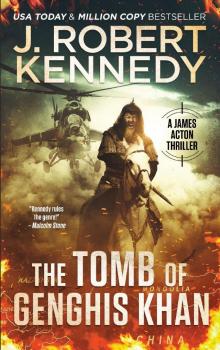 The Tomb of Genghis Khan
The Tomb of Genghis Khan_preview.jpg) Rogue Operator (A Special Agent Dylan Kane Thriller, Book #1)
Rogue Operator (A Special Agent Dylan Kane Thriller, Book #1)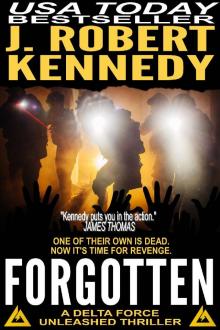 Forgotten
Forgotten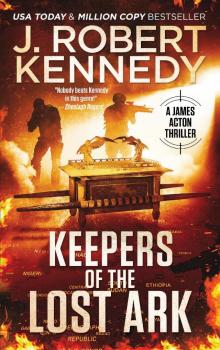 Keepers of the Lost Ark
Keepers of the Lost Ark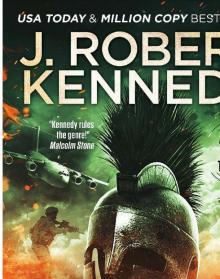 The Cylon Curse
The Cylon Curse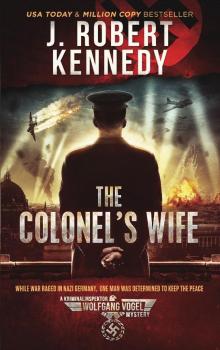 The Colonel's Wife
The Colonel's Wife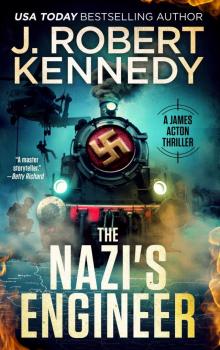 The Nazi's Engineer
The Nazi's Engineer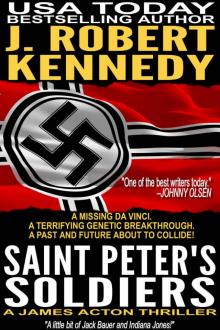 Saint Peter's Soldiers (A James Acton Thriller, Book #14)
Saint Peter's Soldiers (A James Acton Thriller, Book #14)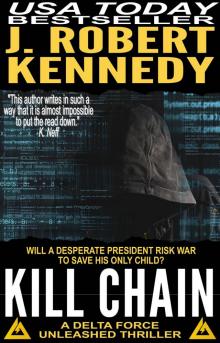 Kill Chain
Kill Chain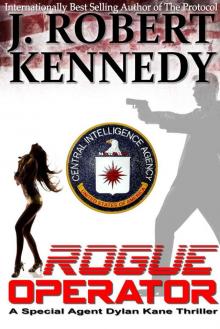 Rogue Operator
Rogue Operator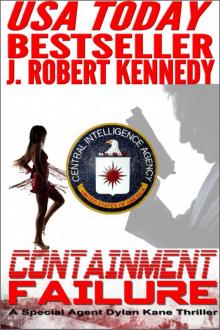 Containment Failure (A Special Agent Dylan Kane Thriller, Book #2)
Containment Failure (A Special Agent Dylan Kane Thriller, Book #2) The Lazarus Moment
The Lazarus Moment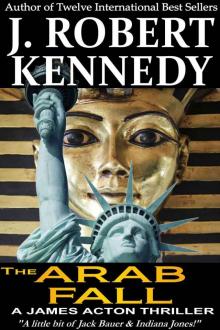 The Arab Fall (A James Acton Thriller, Book #6) (James Acton Thrillers)
The Arab Fall (A James Acton Thriller, Book #6) (James Acton Thrillers) Payback
Payback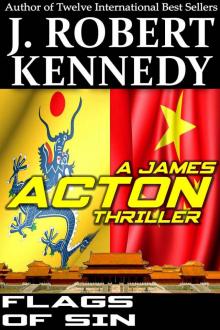 Flags of Sin - 05
Flags of Sin - 05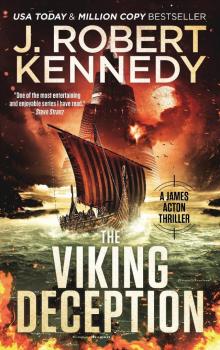 The Viking Deception
The Viking Deception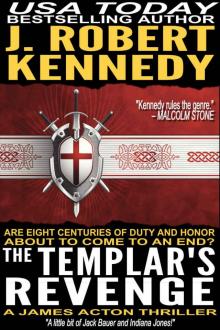 The Templar's Revenge (A James Acton Thriller, #19) (James Acton Thrillers)
The Templar's Revenge (A James Acton Thriller, #19) (James Acton Thrillers)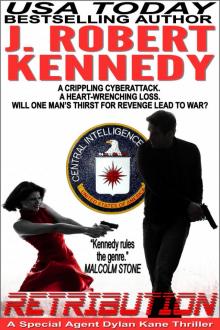 Retribution - A Special Agent Dylan Kane Thriller Book #7
Retribution - A Special Agent Dylan Kane Thriller Book #7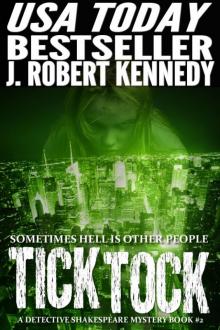 Tick Tock (A Detective Shakespeare Mystery, Book #2)
Tick Tock (A Detective Shakespeare Mystery, Book #2) Blood Relics (A James Acton Thriller, #12)
Blood Relics (A James Acton Thriller, #12)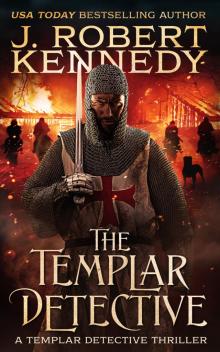 The Templar Detective
The Templar Detective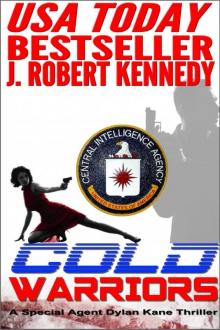 Cold Warriors (A Special Agent Dylan Kane Thriller, Book #3)
Cold Warriors (A Special Agent Dylan Kane Thriller, Book #3)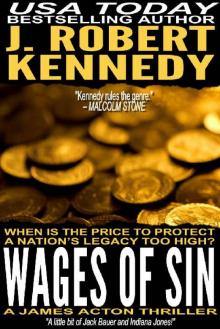 Wages of Sin (A James Acton Thriller, #17) (James Acton Thrillers)
Wages of Sin (A James Acton Thriller, #17) (James Acton Thrillers) The Templar Detective and the Parisian Adulteress
The Templar Detective and the Parisian Adulteress Pompeii's Ghosts (A James Acton Thriller, #9)
Pompeii's Ghosts (A James Acton Thriller, #9) Raging Sun (A James Acton Thriller, #16) (James Acton Thrillers)
Raging Sun (A James Acton Thriller, #16) (James Acton Thrillers) The Riddle (A James Acton Thriller, Book #11)
The Riddle (A James Acton Thriller, Book #11)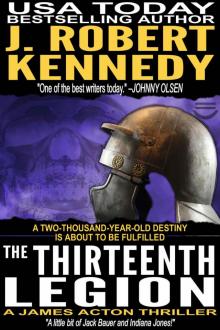 The Thirteenth Legion (A James Acton Thriller, #15) (James Acton Thrillers)
The Thirteenth Legion (A James Acton Thriller, #15) (James Acton Thrillers)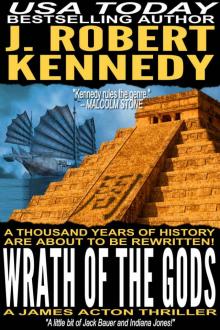 Wrath of the Gods (A James Acton Thriller, #18) (James Acton Thrillers)
Wrath of the Gods (A James Acton Thriller, #18) (James Acton Thrillers) Sins of the Titanic (A James Acton Thriller, #13)
Sins of the Titanic (A James Acton Thriller, #13) Amazon Burning (A James Acton Thriller, #10)
Amazon Burning (A James Acton Thriller, #10)